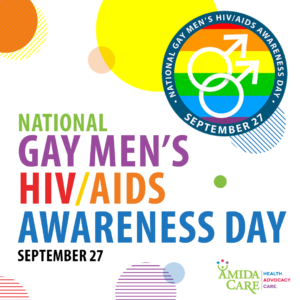National Gay Men’s HIV/AIDS Awareness Day: Continuing Medical Advances

Wednesday, September 27, is National Gay Men’s HIV/AIDS Awareness Day, a time to acknowledge the disproportionate impact of HIV on gay, bisexual, and other men who have sex with men (MSM). It is also a day to celebrate the medical advances that have drastically improved the health and lives of those living with HIV.
Unfortunately, social and structural issues such as HIV stigma, homophobia, discrimination, poverty, and limited access to high-quality health care continue to influence health outcomes and drive inequities. MSM of color are more impacted by HIV than any other group in the U.S. According to recent statistics from the Centers for Disease Control, 26% of new HIV infections were among Black gay and bisexual men and 23% among Latino gay and bisexual men, though both groups make up much smaller percentages of the U.S. population.
Fortunately, for people living with HIV, antiretroviral therapy (ART) can help people become undetectable (and untransmittable), especially those who start medication soon after their diagnosis, which is why it is so important to be tested frequently and treated promptly. Recently, a new class of antiretroviral medication was approved by the FDA to help those who have difficulty being successfully treated with existing medications. Also, a recent study showed the efficacy of long-acting injectable ART for people who have historically had decreased access to antiretroviral therapy.
September is Sexual Health Month, so this is also a great time to raise awareness of pre-exposure prophylaxis (PrEP), medication that decreases the risk of HIV infection by around 99%. PrEP, often taken as a once-daily pill, has made a big dent in the rate of new HIV infections, but only among white MSM. It is hoped that recently available long-acting injectable PrEP will decrease infections in communities of color. Recently, U.S. Preventive Services Task Force (USPTF) gave a ‘Grade A’ recommendation to three PrEP medications including cabotegravir, which is used in injectables–a much-needed option for those who have difficulty taking pills daily. USPSTF’s recommendation will also ensure that more people placed at the highest risk for HIV have access PrEP without high co-pays.
While it is great that new, more effective and easier-to-use HIV medications are being approved, people of color will not benefit if barriers to access are not effectively addressed. We need to fully understand and embrace the healthcare needs of LGBTQ+ people of color, create programs to address them, and establish systems to deliver the health care they need in a sensitive, culturally embracing manner.
These initiatives, along with continuing medical advances, will help finally end the HIV epidemic in New York and across the country.
